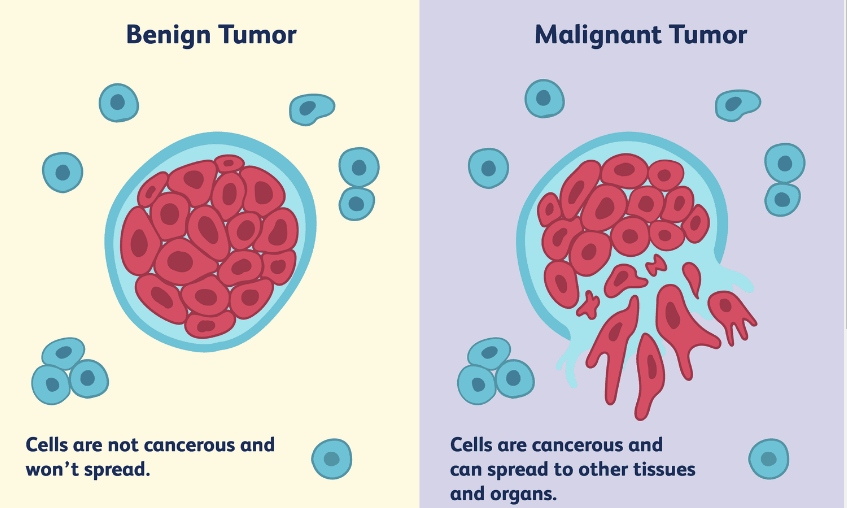Benign tumors are growths that are non-cancerous and typically considered harmless. However, there's often confusion and concern about whether benign tumors have the potential to transform into cancerous growths over time. In this blog, we'll explore the nature of benign tumors, their differences from malignant tumors, and whether they can indeed turn cancerous.
Understanding Benign Tumors:
Benign tumors are abnormal growths of cells that develop within a specific tissue or organ in the body. Unlike malignant tumors, which are cancerous and have the ability to invade nearby tissues and spread to other parts of the body (a process known as metastasis), benign tumors usually grow slowly and remain confined to their site of origin. While they may cause symptoms or health issues depending on their size and location, benign tumors do not pose the same threat to health and life as malignant tumors.
Characteristics of Benign Tumors:
Benign tumors exhibit several key characteristics that distinguish them from malignant tumors:
-
Growth Rate: Benign tumors tend to grow slowly and may stop growing or remain stable in size over time. They do not typically exhibit the rapid and uncontrolled growth seen in malignant tumors.
-
Encapsulation: Benign tumors are often encapsulated, meaning they are surrounded by a fibrous capsule that separates them from surrounding tissues. This encapsulation helps contain the tumor and prevents it from infiltrating nearby structures.
-
Cellular Characteristics: Under the microscope, cells in benign tumors appear relatively normal in shape, size, and organization. They do not exhibit the abnormal cellular features, such as large nuclei and increased mitotic activity, commonly seen in malignant tumors.
-
Lack of Metastasis: Benign tumors do not have the ability to metastasize or spread to other parts of the body. Instead, they remain localized to the tissue or organ where they originated.
Can Benign Tumors Turn Cancerous?
While benign tumors are not inherently cancerous, there is a rare possibility that they may undergo transformation into malignant tumors over time. This phenomenon, known as tumor progression or malignant transformation, occurs when genetic mutations or other molecular changes occur within the cells of a benign tumor, leading to the acquisition of malignant characteristics.
Factors that may increase the risk of malignant transformation in benign tumors include:
-
Genetic Factors: Some benign tumors may harbor genetic mutations or alterations that predispose them to malignant transformation. These mutations may be inherited or acquired over time due to environmental factors or other influences.
-
Chronic Inflammation: Chronic inflammation within or around a benign tumor may create a microenvironment conducive to the development of cancerous changes. Inflammatory processes can promote cell proliferation, DNA damage, and genetic instability, increasing the risk of malignant transformation.
-
Radiation Exposure: Previous exposure to ionizing radiation, such as radiation therapy for another condition, may increase the risk of malignant transformation in benign tumors. Radiation can induce DNA damage and genetic mutations that contribute to cancer development.
-
Hormonal Influences: Hormonal imbalances or excessive hormone stimulation may promote the growth and progression of certain benign tumors, increasing the likelihood of malignant transformation. This is particularly relevant in hormone-sensitive tumors such as certain types of breast and uterine tumors.
Conclusion:
While benign tumors are typically non-cancerous and pose minimal health risks, there is a rare possibility that they may undergo malignant transformation over time. Factors such as genetic mutations, chronic inflammation, radiation exposure, and hormonal influences may contribute to the progression of benign tumors to cancerous growths. However, it's important to emphasize that malignant transformation is uncommon and occurs in only a small subset of benign tumors. Nevertheless, individuals with benign tumors should be aware of the potential for malignant transformation and discuss any concerns or changes in symptoms with their healthcare providers. Regular monitoring and appropriate medical management can help detect any signs of malignant transformation early and facilitate prompt intervention if necessary, ensuring the best possible outcomes for patients.





